Tiffany Barnes
DK
Enhancing Mathematical Problem Solving in LLMs through Execution-Driven Reasoning Augmentation
Feb 03, 2026Abstract:Mathematical problem solving is a fundamental benchmark for assessing the reasoning capabilities of artificial intelligence and a gateway to applications in education, science, and engineering where reliable symbolic reasoning is essential. Although recent advances in multi-agent LLM-based systems have enhanced their mathematical reasoning capabilities, they still lack a reliably revisable representation of the reasoning process. Existing agents either operate in rigid sequential pipelines that cannot correct earlier steps or rely on heuristic self-evaluation that can fail to identify and fix errors. In addition, programmatic context can distract language models and degrade accuracy. To address these gaps, we introduce Iteratively Improved Program Construction (IIPC), a reasoning method that iteratively refines programmatic reasoning chains and combines execution feedback with the native Chain-of-thought abilities of the base LLM to maintain high-level contextual focus. IIPC surpasses competing approaches in the majority of reasoning benchmarks on multiple base LLMs. All code and implementations are released as open source.
The Promise and Limits of LLMs in Constructing Proofs and Hints for Logic Problems in Intelligent Tutoring Systems
May 07, 2025Abstract:Intelligent tutoring systems have demonstrated effectiveness in teaching formal propositional logic proofs, but their reliance on template-based explanations limits their ability to provide personalized student feedback. While large language models (LLMs) offer promising capabilities for dynamic feedback generation, they risk producing hallucinations or pedagogically unsound explanations. We evaluated the stepwise accuracy of LLMs in constructing multi-step symbolic logic proofs, comparing six prompting techniques across four state-of-the-art LLMs on 358 propositional logic problems. Results show that DeepSeek-V3 achieved superior performance with 84.4% accuracy on stepwise proof construction and excelled particularly in simpler rules. We further used the best-performing LLM to generate explanatory hints for 1,050 unique student problem-solving states from a logic ITS and evaluated them on 4 criteria with both an LLM grader and human expert ratings on a 20% sample. Our analysis finds that LLM-generated hints were 75% accurate and rated highly by human evaluators on consistency and clarity, but did not perform as well explaining why the hint was provided or its larger context. Our results demonstrate that LLMs may be used to augment tutoring systems with logic tutoring hints, but requires additional modifications to ensure accuracy and pedagogical appropriateness.
LLMs' Reshaping of People, Processes, Products, and Society in Software Development: A Comprehensive Exploration with Early Adopters
Mar 06, 2025Abstract:Large language models (LLMs) like OpenAI ChatGPT, Google Gemini, and GitHub Copilot are rapidly gaining traction in the software industry, but their full impact on software engineering remains insufficiently explored. Despite their growing adoption, there is a notable lack of formal, qualitative assessments of how LLMs are applied in real-world software development contexts. To fill this gap, we conducted semi-structured interviews with sixteen early-adopter professional developers to explore their use of LLMs throughout various stages of the software development life cycle. Our investigation examines four dimensions: people - how LLMs affect individual developers and teams; process - how LLMs alter software engineering workflows; product - LLM impact on software quality and innovation; and society - the broader socioeconomic and ethical implications of LLM adoption. Thematic analysis of our data reveals that while LLMs have not fundamentally revolutionized the development process, they have substantially enhanced routine coding tasks, including code generation, refactoring, and debugging. Developers reported the most effective outcomes when providing LLMs with clear, well-defined problem statements, indicating that LLMs excel with decomposed problems and specific requirements. Furthermore, these early-adopters identified that LLMs offer significant value for personal and professional development, aiding in learning new languages and concepts. Early-adopters, highly skilled in software engineering and how LLMs work, identified early and persisting challenges for software engineering, such as inaccuracies in generated content and the need for careful manual review before integrating LLM outputs into production environments. Our study provides a nuanced understanding of how LLMs are shaping the landscape of software development, with their benefits, limitations, and ongoing implications.
Bridging Declarative, Procedural, and Conditional Metacognitive Knowledge Gap Using Deep Reinforcement Learning
Apr 23, 2023



Abstract:In deductive domains, three metacognitive knowledge types in ascending order are declarative, procedural, and conditional learning. This work leverages Deep Reinforcement Learning (DRL) in providing adaptive metacognitive interventions to bridge the gap between the three knowledge types and prepare students for future learning across Intelligent Tutoring Systems (ITSs). Students received these interventions that taught how and when to use a backward-chaining (BC) strategy on a logic tutor that supports a default forward-chaining strategy. Six weeks later, we trained students on a probability tutor that only supports BC without interventions. Our results show that on both ITSs, DRL bridged the metacognitive knowledge gap between students and significantly improved their learning performance over their control peers. Furthermore, the DRL policy adapted to the metacognitive development on the logic tutor across declarative, procedural, and conditional students, causing their strategic decisions to be more autonomous.
Leveraging Deep Reinforcement Learning for Metacognitive Interventions across Intelligent Tutoring Systems
Apr 17, 2023

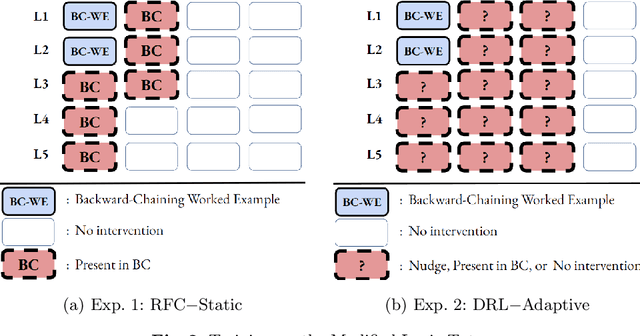

Abstract:This work compares two approaches to provide metacognitive interventions and their impact on preparing students for future learning across Intelligent Tutoring Systems (ITSs). In two consecutive semesters, we conducted two classroom experiments: Exp. 1 used a classic artificial intelligence approach to classify students into different metacognitive groups and provide static interventions based on their classified groups. In Exp. 2, we leveraged Deep Reinforcement Learning (DRL) to provide adaptive interventions that consider the dynamic changes in the student's metacognitive levels. In both experiments, students received these interventions that taught how and when to use a backward-chaining (BC) strategy on a logic tutor that supports a default forward-chaining strategy. Six weeks later, we trained students on a probability tutor that only supports BC without interventions. Our results show that adaptive DRL-based interventions closed the metacognitive skills gap between students. In contrast, static classifier-based interventions only benefited a subset of students who knew how to use BC in advance. Additionally, our DRL agent prepared the experimental students for future learning by significantly surpassing their control peers on both ITSs.
Mixing Backward- with Forward-Chaining for Metacognitive Skill Acquisition and Transfer
Mar 18, 2023Abstract:Metacognitive skills have been commonly associated with preparation for future learning in deductive domains. Many researchers have regarded strategy- and time-awareness as two metacognitive skills that address how and when to use a problem-solving strategy, respectively. It was shown that students who are both strategy-and time-aware (StrTime) outperformed their nonStrTime peers across deductive domains. In this work, students were trained on a logic tutor that supports a default forward-chaining (FC) and a backward-chaining (BC) strategy. We investigated the impact of mixing BC with FC on teaching strategy- and time-awareness for nonStrTime students. During the logic instruction, the experimental students (Exp) were provided with two BC worked examples and some problems in BC to practice how and when to use BC. Meanwhile, their control (Ctrl) and StrTime peers received no such intervention. Six weeks later, all students went through a probability tutor that only supports BC to evaluate whether the acquired metacognitive skills are transferred from logic. Our results show that on both tutors, Exp outperformed Ctrl and caught up with StrTime.
The Power of Nudging: Exploring Three Interventions for Metacognitive Skills Instruction across Intelligent Tutoring Systems
Mar 18, 2023



Abstract:Deductive domains are typical of many cognitive skills in that no single problem-solving strategy is always optimal for solving all problems. It was shown that students who know how and when to use each strategy (StrTime) outperformed those who know neither and stick to the default strategy (Default). In this work, students were trained on a logic tutor that supports a default forward-chaining and a backward-chaining (BC) strategy, then a probability tutor that only supports BC. We investigated three types of interventions on teaching the Default students how and when to use which strategy on the logic tutor: Example, Nudge and Presented. Meanwhile, StrTime students received no interventions. Overall, our results show that Nudge outperformed their Default peers and caught up with StrTime on both tutors.
Investigating the Impact of Backward Strategy Learning in a Logic Tutor: Aiding Subgoal Learning towards Improved Problem Solving
Jul 27, 2022

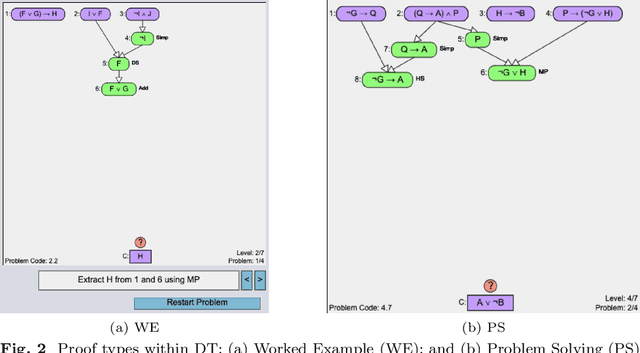
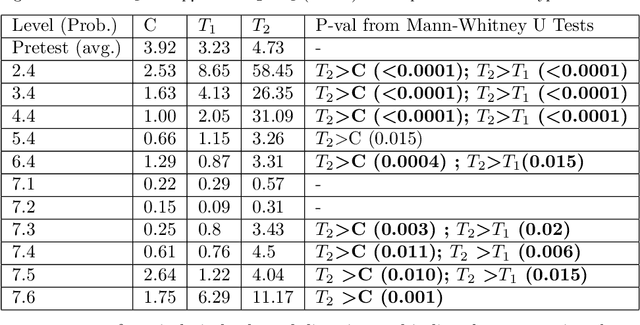
Abstract:Learning to derive subgoals reduces the gap between experts and students and makes students prepared for future problem solving. Researchers have explored subgoal labeled instructional materials with explanations in traditional problem solving and within tutoring systems to help novices learn to subgoal. However, only a little research is found on problem-solving strategies in relationship with subgoal learning. Also, these strategies are under-explored within computer-based tutors and learning environments. Backward problem-solving strategy is closely related to the process of subgoaling, where problem solving iteratively refines the goal into a new subgoal to reduce difficulty. In this paper, we explore a training strategy for backward strategy learning within an intelligent logic tutor that teaches logic proof construction. The training session involved backward worked examples (BWE) and problem-solving (BPS) to help students learn backward strategy towards improving their subgoaling and problem-solving skills. To evaluate the training strategy, we analyzed students' 1) experience with and engagement in learning backward strategy, 2) performance, and 3) proof construction approaches in new problems that they solved independently without tutor help after each level of training and in post-test. Our results showed that, when new problems were given to solve without any tutor help, students who were trained with both BWE and BPS outperformed students who received none of the treatment or only BWE during training. Additionally, students trained with both BWE and BPS derived subgoals during proof construction with significantly higher efficiency than the other two groups.
Enhancing a Student Productivity Model for Adaptive Problem-Solving Assistance
Jul 07, 2022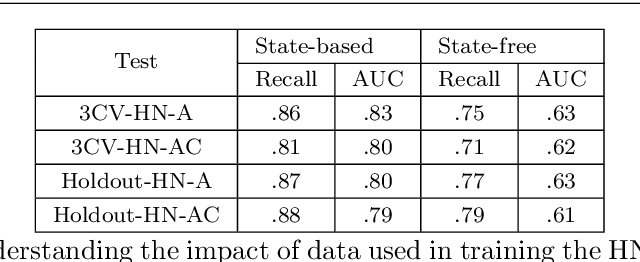
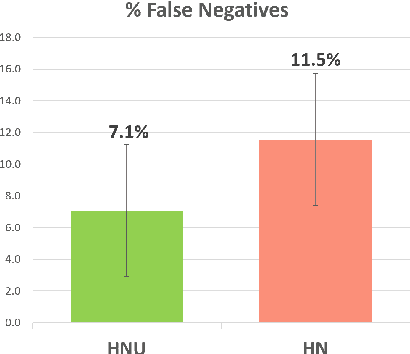

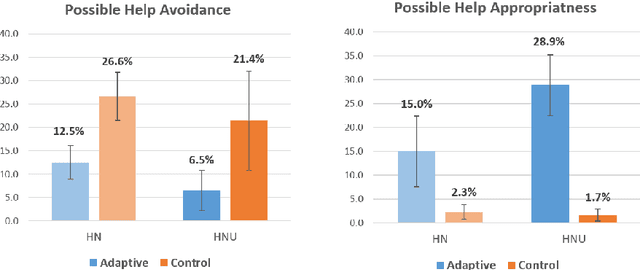
Abstract:Research on intelligent tutoring systems has been exploring data-driven methods to deliver effective adaptive assistance. While much work has been done to provide adaptive assistance when students seek help, they may not seek help optimally. This had led to the growing interest in proactive adaptive assistance, where the tutor provides unsolicited assistance upon predictions of struggle or unproductivity. Determining when and whether to provide personalized support is a well-known challenge called the assistance dilemma. Addressing this dilemma is particularly challenging in open-ended domains, where there can be several ways to solve problems. Researchers have explored methods to determine when to proactively help students, but few of these methods have taken prior hint usage into account. In this paper, we present a novel data-driven approach to incorporate students' hint usage in predicting their need for help. We explore its impact in an intelligent tutor that deals with the open-ended and well-structured domain of logic proofs. We present a controlled study to investigate the impact of an adaptive hint policy based on predictions of HelpNeed that incorporate students' hint usage. We show empirical evidence to support that such a policy can save students a significant amount of time in training, and lead to improved posttest results, when compared to a control without proactive interventions. We also show that incorporating students' hint usage significantly improves the adaptive hint policy's efficacy in predicting students' HelpNeed, thereby reducing training unproductivity, reducing possible help avoidance, and increasing possible help appropriateness (a higher chance of receiving help when it was likely to be needed). We conclude with suggestions on the domains that can benefit from this approach as well as the requirements for adoption.
Code-DKT: A Code-based Knowledge Tracing Model for Programming Tasks
Jun 07, 2022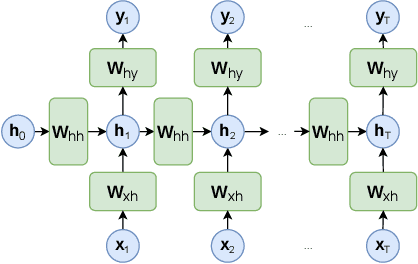

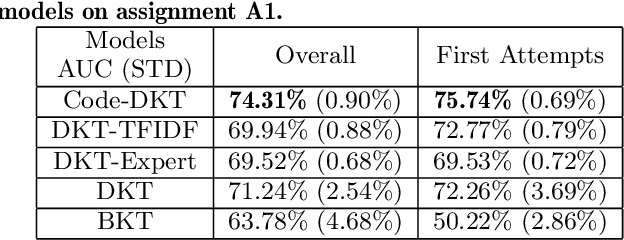
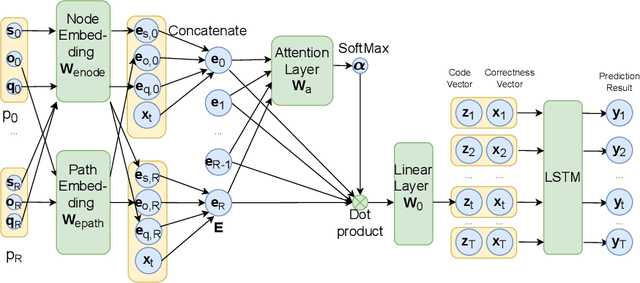
Abstract:Knowledge tracing (KT) models are a popular approach for predicting students' future performance at practice problems using their prior attempts. Though many innovations have been made in KT, most models including the state-of-the-art Deep KT (DKT) mainly leverage each student's response either as correct or incorrect, ignoring its content. In this work, we propose Code-based Deep Knowledge Tracing (Code-DKT), a model that uses an attention mechanism to automatically extract and select domain-specific code features to extend DKT. We compared the effectiveness of Code-DKT against Bayesian and Deep Knowledge Tracing (BKT and DKT) on a dataset from a class of 50 students attempting to solve 5 introductory programming assignments. Our results show that Code-DKT consistently outperforms DKT by 3.07-4.00% AUC across the 5 assignments, a comparable improvement to other state-of-the-art domain-general KT models over DKT. Finally, we analyze problem-specific performance through a set of case studies for one assignment to demonstrate when and how code features improve Code-DKT's predictions.
 Add to Chrome
Add to Chrome Add to Firefox
Add to Firefox Add to Edge
Add to Edge